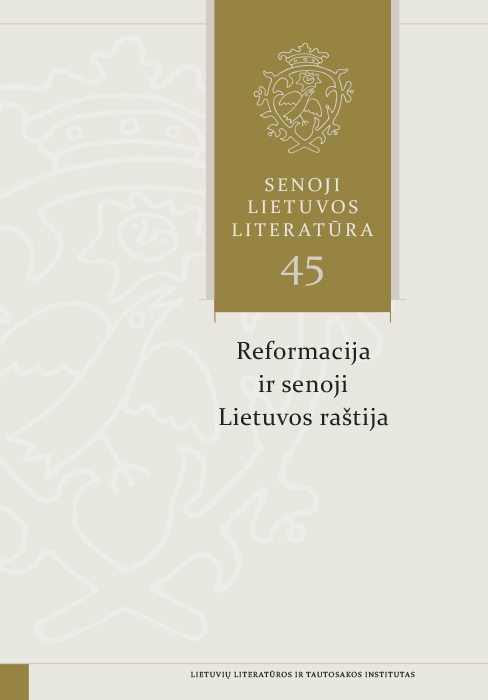Sola fides sufficit: Polemical Elements in Binarius Chalecianus (1642)
Abstract
The object of the article is a work of Latin Baroque literature of the Grand Duchy of Lithuania, the book of emblematic meditations Binarius Chalecianus, sive duo manipuli liliorum... (Vilnae: In officina typographica patrum Basilianorum ad Edem SS. Trinitatis, 1642) written by the noble Mikalojus Kristupas Chaleckis (Mikołaj Krzystof Chalecki) in honour of the Holy Virgin Mary. In this article, emphasis is placed on the polemic aspect that is conveyed in a rather original manner in this exceptional work.
The analysis of the case discussed reveals a crypto-polemic elements in the texts of Binarius Chalecianus and shows the unique forms of such a polemic as being specific to the multi-confessional cultural environment of the Grand Duchy of Lithuania.
Chalecki’s method of polemic uses more subtle forms than the means of direct offensive: he diverts the main phrases summarizing theological doctrines of Reformation to the advantage of his arguments. It seems that in such a way he tries to bring back the theses of the Reformers to the primary context and to show they had existed in the tradition of the Church before the Reformation.
For instance, the text hides references to the key doctrines that cause disagreement between the Catholics and the Evangelicals (predestination, justification), and the sola fide (‘faith alone’) argument is used by Chalecki’s to support the doctrines of transubstantiation and Incarnation. The significance of the role of Virgin Mary in Incarnation is confirmed by binary cryptoquotes, both from Thomas Aquinas and from Akatist Hymn of an ancient orthodox tradition that inseparably links Christology and Mariology. Using Latin and Greek sources, the author of the work speaks as though from the position of the Church Union placing emphasis on the unity of Eastern and Western traditions in the worship of Virgin Mary and in other issues in the polemic with the Reformers. Responding to the standpoint of the fathers of the Reformation to base their perspectives toward Mary on the Scripture alone, considerable attention is paid to biblical sources. Such position of the author of Binarius also responds the instructions of the Council of Trent.
Although it reflects the trends of its age, Binarius stands out among numerous sixteenth-century mariological works as an original case of expression of personalised devotion to the Mother of God and of a quite sophisticated interconfessional polemic. In this case the polemic aspect is expressed not in directly invective but in much more refined forms.
Most read articles by the same author(s)
- Ona Daukšienė, Transformations of Biblical Sources in Sarbievius’ Religious Poetry , Senoji Lietuvos literatūra: Vol. 38 (2014): Senoji Lietuvos literatūra
- Ona Daukšienė, Sigismundus Laetus – Žygimantas Liauksminas? On Some Mysterious Addressees of Sarbievius’s Odes , Senoji Lietuvos literatūra: Vol. 44 (2017): Senoji Lietuvos literatūra
- Matas Nevė, Eugenija Ulčinaitė, Ona Daukšienė, The Radvila’s Tapestry (translated from Latin by Eugenija Ulčinaitė) , Senoji Lietuvos literatūra: Vol. 40 (2015): Senoji Lietuvos literatūra
- Ona Daukšienė, Asta Vaškelienė, Annotations , Senoji Lietuvos literatūra: Vol. 45 (2018): Senoji Lietuvos literatūra




